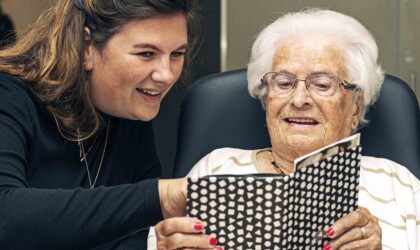Dementia is a growing social problem. The WHO considers dementia the first priority. Its high cost will challenge health systems to cope with the expected future increase in cases. One solution lies in the socialisation of care. To enable this, informal carers are a crucial factor.
But caring for people with dementia (PLWD) is much more challenging than caring for people without dementia. The health of informal care givers suffers from this as a result. A strong network, more knowledge, understanding and skills among informal care givers can make a difference in their care burden. Also, providing respite care for informal care givers to engage in relaxation can be a promising coping strategy.
Technological applications to service PLWD and their informal care givers exist but are often unknown, are not developed in collaboration with informal care givers and are therefore not tailored to their needs. Tools on the market are not sufficiently accessible, cannot be experimented with and are often not introduced in time.










